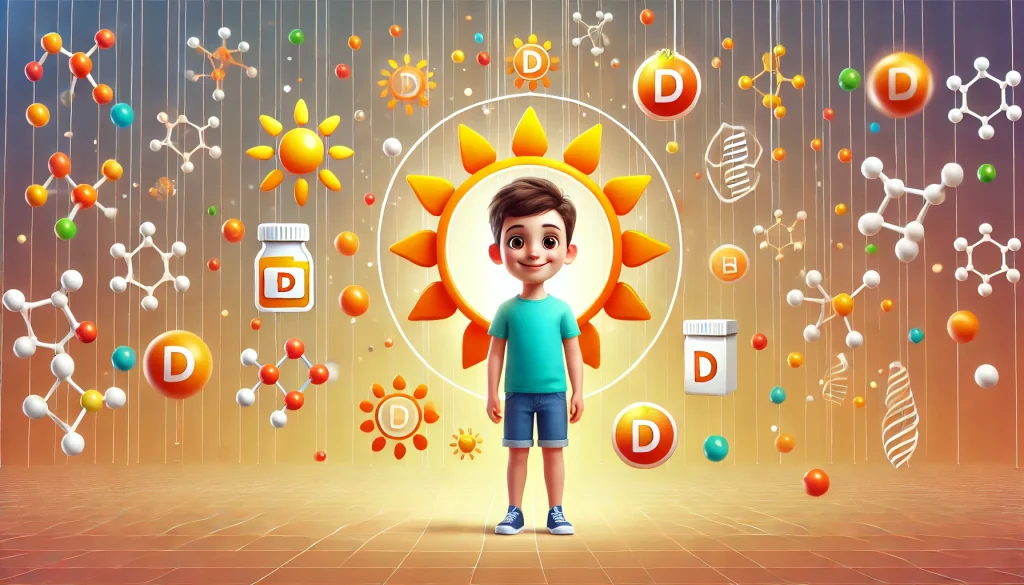We are talking about Tics and Vitamin D Levels.
- What studies say
- Is there a connection between Tics and Vitamin D
- What is missing from this study
Vitamin D: The Sunshine Nutrient That Could Help Manage Tic Disorders
Listen up, folks! If you’re a parent of a child with tics or Tourette’s, you’re gonna want to pay attention. A recent study out of Shanghai might just hold the key to a piece of the tic-tackling puzzle. And it all comes down to our good friend, vitamin D.
The Shocking Connection
Picture this: researchers rounded up a whopping 2,960 kids with tic disorders and 2,655 healthy kiddos. They tested their vitamin D levels and found that the tic group had significantly more vitamin D deficiencies, especially in the over-9 crowd. Coincidence? We think not!
But before you start chugging vitamin D supplements, let’s dive into the nitty-gritty of what could be causing these low levels in the first place.
The Sunshine Vitamin 🌅
Our bodies are pretty darn amazing. With a little help from the sun, we can actually create our own vitamin D! But here’s the catch: if you’re bundled up all winter or slathering on the SPF 24/7, you might be missing out on this crucial nutrient.
Now, I know what you’re thinking. “But Piper, skin cancer is no joke!” Trust me, as someone who’s had a few too many mole scares, I feel you. The key is finding that sweet spot – a little unprotected sun exposure during off-peak hours, then bring on the hat and sunscreen!
The Gut-D Connection 🦠🔍
But what if you’re soaking up plenty of rays and still coming up short on the D front? Enter: the gut. If your gut health is in the gutter (pun intended), you might not be absorbing all the nutrients you need, including vitamin D.
Things like leaky gut, celiac disease, and even genetics can all play a role in how well your body uses and creates vitamin D. It’s like a big ol’ game of nutritional dominoes!
The D Dream Team 🏆
But vitamin D doesn’t work alone. It needs a squad of other nutrients to really shine. We’re talking magnesium, zinc, vitamin A – the whole gang. If you’re low on these crucial co-factors, your D levels might suffer.
And let’s not forget about the liver! This hard-working organ is responsible for converting vitamin D into its active form. But if your liver is overburdened with toxins and not getting the nutrients it needs, you might end up with a serious case of “stagnant liver.” (Thanks, Chinese medicine, for the catchy term!)
The Food Factor
Now, I know you’re probably wondering, “Can’t I just eat my way to vitamin D bliss?” Well, it’s not quite that simple. While foods like salmon and cod liver oil can help, it’s tough to get enough D from diet alone.
Plus, if you’re chowing down on processed junk and sugar (we’re looking at you, birthday party cupcakes), your immune system might take a serious hit. And a struggling immune system is the last thing you need when you’re trying to tackle tics!
The Bottom Line
So, what’s the takeaway here? Vitamin D deficiency and tic disorders might just go hand-in-hand, but the reasons behind it are complex. It’s not just about popping a supplement and calling it a day.
We’ve gotta look at the whole picture – gut health, liver function, nutrient co-factors, diet, and even genetics. It’s like a big, beautiful puzzle, and vitamin D is just one piece.
But don’t worry, my tic-warrior parents. You’re not in this alone! With a little sun, a lot of love, and maybe a few strategic supplements, we can help our kiddos thrive, one nutrient at a time.

